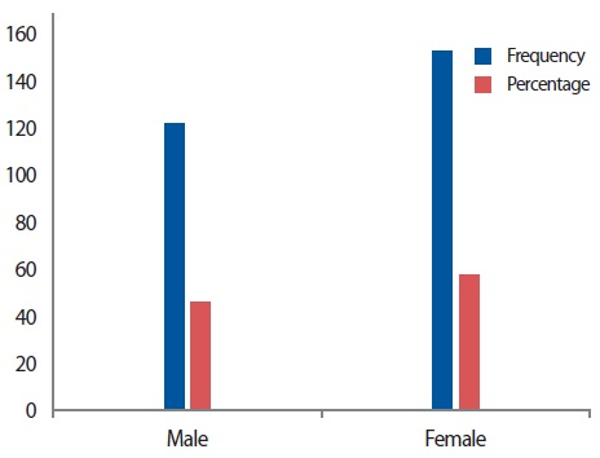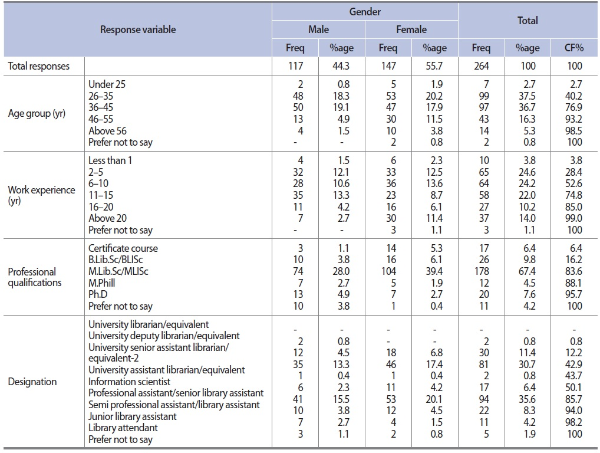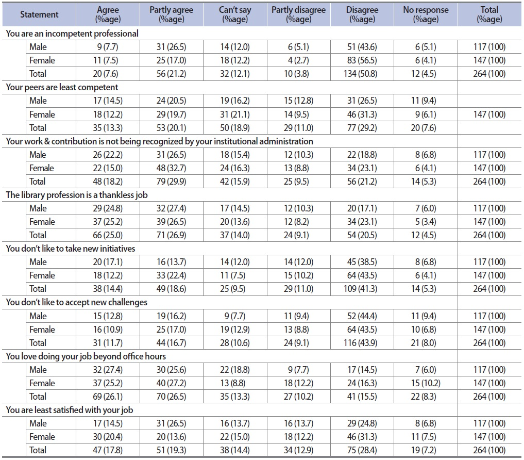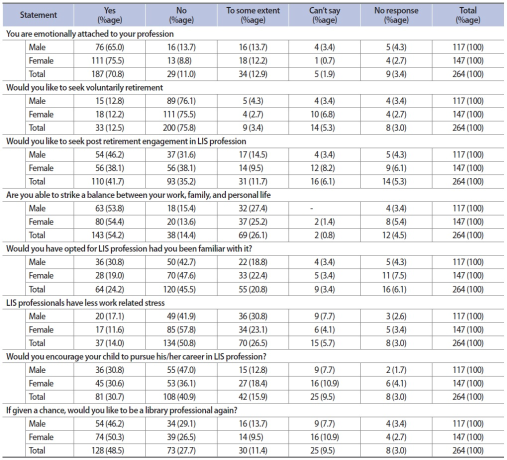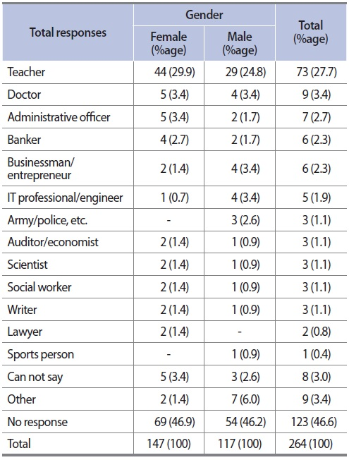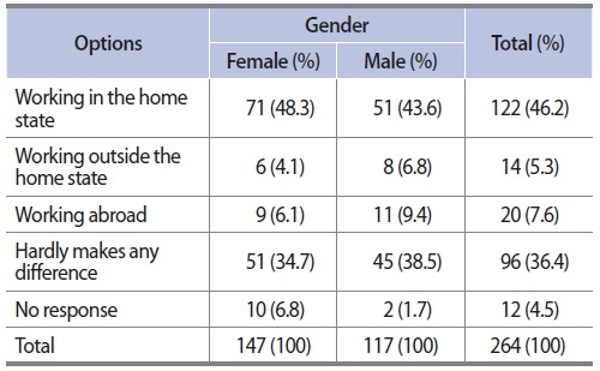1. INTRODUCTION
Studying the cognitive capacities of individuals is one of the most important subjects studied extensively by researchers all across the world, especially while seeking solutions to the problems, which may directly or indirectly emanate from differences in the behavioural patterns of an individual or a group. Job satisfaction and dissatisfaction among a group of employees, working under similar or different conditions apart from being influenced by extrinsic conditions, is equally influenced by intrinsic factors. These factors can be both physical as well as psychological in nature, what we generally owe to the cognitive capacities of an individual.
To live a wholesome and fulfilling life, it is always imperative that an individual should be satisfied on various fronts, and job satisfaction is one of the foremost aspects associated with the wholesome satisfaction of an individual. Salary, work environment, job security, interpersonal relationships, recognition, advancement, and so on are some of the important variables associated with the job satisfaction of employees and the absence of any of these variables may lead to job dissatisfaction. Apart from these and various other variables associated with job satisfaction and dissatisfaction, the psychology of an individual employee is equally important, which plays a very significant role in the overall job satisfaction of an employee.
Till the recent past, especially in the absence of the application of information technology (IT), the job of a library professional was more or less monotonous in nature, less interactive and less attractive, with no spur to inspire an individual or motivate a professional to do something new and significant. With the result, the majority of library professionals used to show lower levels of job satisfaction. The application of information and communication technology in libraries has somewhat helped a great deal in making the library profession more attractive and interactive (Pandita & Dominic, 2018); still, it is the individual psychology of an employee which comes into play for reaping wholesome job satisfaction.
The undergoing study has been undertaken with a view to assess individual psychological perceptions among library and information science (LIS) professionals about their job, which contributes towards their job satisfaction or dissatisfaction. To undertake the study, data were collected from the LIS professionals working in the higher education institutions of Jammu and Kashmir, India. The study is based on the 264 responses generated from respondents working in both government and private institutions. The respondents represent academic, technical, and professional institutions, ranging from universities and colleges to autonomous institutions.
2. BRIEF INTRODUCTION ABOUT THE HIGHER EDUCATION SECTOR OF JAMMU AND KASHMIR
The state of Jammu and Kashmir is in the extreme north of the Union of India, having a population of 12.55 million, with a literacy rate of 68.70% (Government of India, 2011). As of date, apart from seven state universities the state has two central universities, one national institute of technology, one Indian institute of technology, one Indian institute of management studies, two Indian institutes of integrative medicine, over 100 government degree colleges, and nearly 170 private colleges.
3. PROBLEM STATEMENT
The scenario of job satisfaction among LIS professionals in India is not that encouraging, as the majority of LIS professionals in the country are more or less dissatisfied with their employers one or the other way (Pandita, 2017). Salary, though important, is not the lone criterion which can be associated with the job satisfaction of an employee or for that matter to a library professional. There are some psychological aspects as well which significantly affect the job satisfaction of an employee and so holds true about LIS professionals. Among various psychological aspects, the individual psychology of an employee towards his/her job plays a very significant role in his/her overall job satisfaction. Given the fact, it was conceived to assess how far the various psychological aspects, both personal and those associated with the job affect the job satisfaction of library professionals, and to undertake this pilot study the LIS professionals working in the higher education institutions of Jammu and Kashmir were surveyed.
4. OBJECTIVES OF THE STUDY
-
To understand the psychological aspects associated with the job satisfaction of working LIS professionals
-
To find out how far the individual psychology of an employee influences his/her levels of job satisfaction or dissatisfaction
-
To explore the gender based psychological perceptions of library professionals towards their job, their job satisfaction, and the need thereof for their guidance and counseling, if any
5. REVIEW OF LITERATURE
Extensive research has been undertaken in the areas of assessing the influence of cognitive capacities of individuals on their job satisfaction. Job satisfaction in fact reflects the cognitive assessment of an employee towards his/her employer, keeping in view the work conditions and other related aspects which are taken care of by the employer (Weiss & Cropanzano, 1996). Hence this cognitive capacity of an individual is always at work, sometimes accepting things and at others rejecting them in more or less in a silent way. This is what was assessed as a personality disposition by Staw and Ross (1985), who viewed it as an individual approach of an employee towards his/her work, which is generally quite apparent and known to peers and other colleagues.
In a study, Dormann and Zapf (2001) observed 35% variation in the job satisfaction of employees when they were offered a more stable work environment in their changeable work environment. The individual personality of an employee is seen as a building block of individual traits, which reflects both the positive and negative aspects of job satisfaction (Brief & Roberson, 1989). Self-esteem, efficacy, control, and non-neuroticism significantly affects the job satisfaction among individuals (Judge, Locke, Durham, & Kluger, 1998).
Although the behaviour of an individual is generally governed by one’s individual precepts, one cannot rule out the impact of other social aspects which directly or indirectly influence an individual’s behaviour to a significant degree. In the same way, the behaviour of an employee gets equally influenced by his/her peers and by the institutional management. Thereby, it is always an added responsibility of management to govern the behaviour of their employees (Robbins, 2003). Robbins views that transformational leadership, apart from helping in making the maximum out of the employees by helping them to fulfil their professional commitments, also promotes the individual growth of employees and allows less resignation among employees towards their work.
In a study undertaken on 1,300 information professionals, Williamson, Pemberton, and Loundsbury (2005) found a significant correlation between personality variables and job satisfaction. The researchers studied variables like emotional stability, teamwork, work style, work drive, optimism, and emotional resilience under three different sets and found 20%, 19%, and 18% difference in job satisfaction among employees. The researchers also found that library professionals who are more optimistic towards their work, have more emotional resilience, believe in team work, have a vision, and believe in hard work, as such are more satisfied with their jobs than their counterparts who lag in such areas.
In a similar study, Judge, Heller, and Mount (2002) studied a five-factor personality model, which included variables like neuroticism, extraversion, openness to experience, agreeableness, and conscientiousness, by analysing 163 independent samples, and found that neuroticism and extraversion are correlated with job satisfaction. While opting for a conceptual approach, Locke (1976) studied concepts like satisfaction, dissatisfaction, value, emotions, and appraisal by using Rand’s theory of emotions and viewed that job satisfaction and dissatisfaction has not advanced following the adoption of the conception of causality having a correlation with it. While studying the different variables associated with job satisfaction among employees, with special reference to LIS professionals, Pandita and Dominic (2016) viewed the individual psyche of a professional as an important aspect of job satisfaction.
While reviewing sociologists’ perceptions towards library professionals, Satija (2003) observed that the majority of such studies recommended the need for treating librarians at par with regular teachers in all matters, including faculty status. The library professionals who actively participate in the decision making process of their institution, and communicate freely and openly, have better opportunities for growth and have been found to be more committed and satisfied with their job (Burd, 2003). Library professionals should always feel challenged by their work (Reid, 2005) and so should they embrace the changes which are inevitable, especially in this fast and ever changing service oriented world. Most of the changes are aimed towards the betterment of both the profession and professionals, and any resistance to any such positive change hampers both professional and individual growth, which by no means goes well with the overall benefit of society at large. In a study, Pandita (2017) observed that in India every third library professional enters into the profession by chance and not by choice. This in itself speaks about the psychological state of library professionals in India. It should not come to us as a surprise if these one-third of library professionals show dissatisfaction with their job.
6. RESEARCH METHODOLOGY
This study is based on primary data collected from 264 LIS professionals working in the higher education institutions of Jammu and Kashmir, India. The data were collected from the respondents by circulating the questionnaire, specially designed for the purpose. The respondents include the library professionals working in both state and central universities, private and government colleges, medical colleges, nursing colleges, engineering colleges, and other institutes of national importance. Questions were framed keeping in view the objectives of the study. The data were collected by circulating the online link of the questionnaire among the respondents through emails and other social media platforms. Questionnaires were also sent by post to potential respondents at their official postal addresses along with self addressed envelopes so as to facilitate the return of the filled in questionnaire, and thirdly the questionnaires were also circulated and responses were collected by visiting the respondents in person.
7. RESULTS
The responses collected from respondents were compiled and tabulated using MS Excel for easy filtration of data. Computations like addition, subtraction, multiplication, and drawing percentage were performed using MS Excel. Percentage at all places has been drawn to one decimal place and has been rounded off to 100% figure.
Of the total responses generated, 44.3% are male and 55.7% female respondents (Fig. 1). Over 37.5% of respondents are in the age group of 26 to 35 years, followed by 36.7% in the age group of 36 to 45 years. The majority, 24.6% of respondents, have 2 to 5 years of work experience, followed by 24.2% of respondents having 6 to 10 years of work experience. Similarly, in terms of academic qualifications the majority, 67.4% of respondents, have a master’s degree in LIS, followed by 9.4% having a bachelor’s degree in LIS, while a majority 35.6% of respondents are working as semi-professional assistants, followed by 30.7% as assistant librarians and equivalent positions (Table 1).
Gender is not a constraint in the library profession in general and for those working in the state of Jammu and Kashmir in particular, as the majority of the respondents in the present survey are female library professionals and are academically well qualified. Since the majority of respondents are in the 26 to 45 years of age group, as such, it can be emphatically inferred that professionals in the state are quite young, hence they are expected to be tech savvy, and as a result application of information and communication technology in the library services and activities may not be a constraint for these young professionals. LIS in India is believed to be growing more gender specific, as more and more females prefer to join the library profession than males, which is also evident from the response percentage of the present survey.
Normally a professional would never admit of being incompetent, no matter even if one is, but contrary to it, 7.6% of respondents agreed to being incompetent professionals, while 21.2% partly agreed with the statement. An employee can judge his/her competence by assessing the performance of his/her colleagues. If an employee believes that he/she is not able to perform to the extent to which his/her colleagues do, he/she can easily rate himself/herself as incompetent. This self-assessment can help an employee to look for the reasons which act as an impediment in his/her job performance and ultimately affect his/her job satisfaction. Mal-employment is seen as one of the reasons which results in the underperformance of employees. The majority, 50.8% of respondents, disagreed with the statement, while 12.1% of respondents were not sure and 4.5% of respondents preferred not to reply to this particular question (Table 2).
In continuation to the above question, the respondents were asked regarding their peers being least competent; the majority at 29.2% disagreed and 11% partly disagreed, while 13.3% agreed with the statement and 20.1% partly agreed to it. Compared to 26.5% of males, 31.3% of females showed disagreement with the statement, compared to 14.5% of males and 12.2% of females who agreed to it. Here again the reasons can be the same but the other way round. A competent professional is always in a position to judge the job performance capability of his/her colleagues. Incompetent professionals mostly lean against competent professionals for professional help and other advice more often (Table 2).
Undermining the importance of libraries and library professionals is a very common problem faced by library professional across India and is the most compelling reason which leads to job dissatisfaction among LIS professionals. Accordingly, 18.2% of respondents of the present survey agreed and 29.9% of respondents partly agreed with the statement that their contribution is not recognized by their institutional administration. It is quite obvious that library professionals working in institutions where their contribution, role, and importance are not recognized by their institutional administration are bound to show signs of job dissatisfaction. Contrarily, the institutions which recognize the role of library professionals and their contribution in the teaching and research activities show higher levels of job satisfaction. On the gender level, compared to 18.8% of males, 23.1% of females disagree with the statement, while compared to 22.2% of males, 15% of females agree to it. Compared to females, more males agree with the statement and this again corroborated the fact that compared to males more females disagree with the statement.
Appreciating an employee while on the job is perhaps the greatest reward a person gets. Respect and gratitude are the instant rewards a professional receives while serving clientele, and if professionals are not being paid gratitude or respect the way they expect, their morale is bound to come down, which ultimately influences their overall job satisfaction. While trying to ascertain from the professionals how far people pay gratitude to them while serving them, one fourth of the respondents (25%) replied that the library profession is a thankless job, followed by the majority, 26.9% of respondents, who partly agreed to it. However, 20.5% of respondents totally disagreed with it. Here it is equally desired that library professionals should be thorough professionals, as they should never expect gratitude from their clientele, so that it may not lower down the moral and enthusiasm in a professional.
The majority, 41.3% of respondents, disagreed with the statement that they do not like to take new initiatives, while 14.4% deemed the statement right. It is quite encouraging to see the LIS professionals refuting the statement and emphatically saying that they are open to new initiatives. At the gender level, compared to 43.5% of females, 38.5% of males believe that library professionals like to take new initiatives, compared to 17.1% of males and 12.2% of female library professionals who believe that library professionals do not like to take new initiatives. From the analysis it is evident that female library professionals are more proactive in taking new initiatives than their male counterparts. The more a professional is satisfied which his/her job, the more he/she is going to involve himself/herself, which is bound to result in taking new initiatives, and this enthusiasm towards new initiatives remains missing in those employees who are generally dissatisfied with their job (Table 2).
Library professionals are quite open to accepting new challenges, as 43.9% of respondents have refuted the statement that library professionals do not like to accept new challenges. However, 11.7% of respondents viewed that library professionals do not like to accept new challenges. At the gender level, both male and the female respondents have shown almost similar levels of agreement with the statement.
Commitment towards one’s job gets reflected through different ways and means and doing one’s job beyond office hours somewhat signifies the passion of an employee towards his/her job. Accordingly, respondents were asked whether they love doing their job beyond office hours. The majority, 26.5% of respondents, partly agreed and 26.1% of respondents totally agreed with the statement, while 15.5% disagreed and 10.2% partly disagreed with the statement. At the gender level, it can be inferred from the response percentage that compared to female library professionals, male library professionals love to do their job beyond office hours more.
With a view to evaluate overall job satisfaction among LIS professionals, the respondents were asked if they are least satisfied with their job. Contrary to the statement, the majority at 28.4% disagreed and 12.9% partly disagreed with the statement. However, 17.8% of respondents agreed with the statement, backed by 19.3% of respondents, who partly agreed with the statement. At the gender level, compared to 24.8% of males, 31.3% of females disagreed with the statement and compared to 14.5% of males, 20.4% of females agreed to it (Table 2). From the figures it is evident that a mixed trend can be seen in the overall job satisfaction of library professionals working in the state; however, at the gender level, compared to male library professionals, female library professionals are more satisfied with their job.
In the present-day scientific world, if an employee is asked how far he or she is emotionally attached to his/her profession may sound a bit unusual, but the harsh reality is, how so objective we may reflect outlook, but in the heart of hearts there is always space for emotions in each individual. Accordingly, the respondents were asked about their emotional attachment to their job and a whopping 70.8% of respondents admitted to being emotionally attached to their profession. Compared to 75.5% of females, 65% of male respondents admitted to being emotionally attached to their profession. However, 11% of respondents did not show any emotional attachment to their job, while 12.9% rated it to some extent. 1.9% of respondents were not sure and 3.4% of respondents did not reply to this particular question (Table 3).
Upon asking respondents as whether they would like to seek voluntary retirement from the library profession, a whopping 75.8% of respondents replied no, while 12.5% replied yes. This somewhat corroborates that the majority of LIS professionals are willing to carry on with their profession and can be deemed as somewhat satisfied with their job. There is no significant difference between male and female respondents, as professionals of both genders have reflected almost similar opinions.
With a view to corroborate the above statement, the respondents were asked whether they would like to seek post retirement engagement in the LIS profession; the majority at 41.7% replied yes, and 11.7% replied maybe. Compared to 38.1% of females, 46.2% of male respondents replied that if engaged, they will take a post retirement job in the LIS profession. This again corroborates that the majority of LIS professionals find their job meaningful and fulfilling hence they have shown willingness to carry on with the LIS profession if engaged after retirement. Contrarily, 35.2% of respondents replied that they will not take post retirement engagement in the LIS profession. This also somewhat means that nearly one-third of the library professionals working in the higher education institutions in Jammu and Kashmir are not fully satisfied with their job, hence they do not want to continue with it as their post retirement engagement (Table 3).
The majority, 54.2% of respondents, are able to strike a balance between their work, family, and personal life, while 26.1% are able to do this balance to some extent. However, 14.4% find it difficult to strike a balance between their work, family, and personal life. It is pertinent to note that if an employee is not able to strike a balance between work and family life, he/she is bound to show signs of dissatisfaction with his/her job. No considerable difference was found at the gender level, as both male and female respondents equally weighed the question.
There is a perception among LIS circles that the majority of LIS professionals entering into the profession are not generally familiar with the nature of the job and other allied aspects of the LIS profession. Accordingly, the respondents were asked whether they would have opted for the LIS profession had they been familiar with it; 24.2% replied yes, while 20.8% rated to some extent. However, the majority at 45.5% of respondents replied no, which is quite encouraging and reflects that nearly 50% of library professionals entering into the library profession are familiar with the library profession. Here the need can be pressed for drawing awareness about the library profession among the potential library professionals, as a sizable portion of potential library professionals are not aware of the nature of the LIS profession and the types of services they are to render to their clientele.
Upon asking the respondents whether LIS professionals have less work-related stress, 14% agreed while 26.5% rated to some extent. However, the majority at 50.8% of respondents disagreed with it and believe that LIS professionals do have their own lot of job-related stress. Compared to 41.9% of males, 57.8% of female respondents viewed that library professionals have work related stress. This refutes the notion that library professionals have much less work-related stress (Table 3).
The respondents were asked, would they encourage their children to pursue their careers in the library and information profession? The majority, 40.9% of respondents, replied no, and 30.7% replied yes. Here again, it can be inferred that the majority of respondents do not find the LIS profession that rewarding and fulfilling, hence they do not want to encourage their children to pursue their career in LIS, which is quite worrisome. The significant difference can be found at the gender level as well, wherein, against 36.1% of females, 47% of males replied that they will not encourage their children for the library profession. This somewhat also corroborates the fact that compared to male library professionals, female library professionals are more satisfied with their jobs, hence they will not hesitate to encourage their children to take up the library profession. Another 15.9% of respondents were not sure, but replied that maybe they will encourage.
The respondents were asked, if given the chance, would they like to be library professionals again? The majority at 48.5% replied yes, while 11.4% replied to some extent. Compared to 46.2% of males, 50.3% of females reflected their willingness to take up the library profession once again if given a chance. However, 27.7% of respondents categorically rejected the idea.
The general notion is that if one does not get the job of his/her choice, he/she contends with the job which serves as a substitute to his/her choice. In the same way 27.7% of respondents replied that had they not been LIS professionals, they would have been teachers. Compared to 24.8% of males, 29.9% of female respondents replied that they would have been a teacher had they not been a library professional. This confirms that the library and the teaching profession are two faces of the same coin, and as such, those who may have aspired to being a teacher would have definitely felt contented at landing in the library profession. It is quite good to have LIS professionals who had aspired to be doctors, administrative officers, bankers, entrepreneurs, IT professionals, scientists, lawyers, sports persons, and more. What is more surprising to know is that a majority 123 (46.6%) respondents did not reply to this particular question (Table 4).

Respondents were asked about their preferred places of work, where a professional can drag more job satisfaction
The majority, 46.2% of respondents, replied that library professionals working in their home state can find more job satisfaction than those working outside their home state. The scenario is no way different at the gender level, as against 43.6% of males, 48.3% of females uphold this view. Besides, it is an understood fact that females generally tend to work within their home state than their male counterparts. Similarly, 36.4% of respondents viewed that working within the home state or outside the home state makes hardly any difference. Still more, 5.3% of respondents believe that working outside the home state gives more job satisfaction, 7.6% believe that working abroad helps in getting more job satisfaction, while 4.5% of respondents are not sure, hence they did not reply to this particular question (Table 5).
8. FINDINGS AND DISCUSSION
One can understand the cognitive state of a person who himself admits to being an incompetent professional. It is not about being straightforward in reply, but about assessing whether a professional is satisfied with his/her job who believes that he/she is not a competent person. If 7.6% of respondents of the present study admit to being incompetent, in a way it also means that they are aware of the fact that they are not delivering the services the way and to the extent they are expected, hence they can never be satisfied with their job. Contrary to this fact, if the respondent deems his/her peers as incompetent, this also impliedly means that the respondent is quite confident of what the profession demands and how far his/her peers are able to deliver on the expected lines. The professionals who rate their peers as incompetent can be inferred to be those who yearn for and feel happy if their peers are competent and result oriented, hence a peer’s work efficiency may also serve as a sense of satisfaction to an employee.
Working beyond office hours in the library can be for two reasons, either the person is overburdened or the person loves his/her job to such an extent that working beyond office hours does not bother him/her at all. If a person loves to do his/her job beyond the office hours it means the person is satisfied with his/her profession. From the data analysis it is evident that a fair percentage of library professionals working in the higher education institutions of the state love to do their job beyond office hours. However, compared to female library professionals, male library professionals are more open to working beyond office hours. By and large, the library professionals working in the higher education sector of Jammu and Kashmir are satisfied with their job and those who have shown dissatisfaction with their job can be for different reasons and the foremost being that a good number of respondents are working on a temporary basis. Similarly, advancement, work environment, and other factors may be contributing to their dissatisfaction.
Every job of whatsoever nature involves stresses of its own kind, and so holds true of the library profession and this gets corroborated by the fact that over 50% of respondents replied that they have work related stress. Compared to male library professionals, female professionals feel more stressed. Interestingly, one third of the library professionals viewed that they will encourage their children to opt for the LIS profession. This clearly indicates the fact that parents who are willing to encourage their children toward the library profession are satisfied with their job. Compared to males, female library professionals have shown more interest in encouraging their children to pursue a career as a library professional, which clearly reflects that female LIS professionals find the library profession more fulfilling and satisfying than their male counterparts.
The majority of library professionals see the LIS profession parallel to that of the teaching profession and are content with the way they contribute to the teaching and research activities of their respective institution. Teaching appears to be the most preferred profession among the females given the way the majority of the female respondents have replied that they had aspired for the teaching profession. The majority of library professionals working in the higher education institutions of Jammu and Kashmir are of the view that a professional can find more job satisfaction by working in his/her home state rather than outside or abroad. But at the same time nearly one-third of the respondents believe that working within one’s home state or outside the home state hardly makes any difference on the job satisfaction of an employee.
It is an accepted fact that if there is someone who can uplift the image of the library profession among the masses, it is the library professionals themselves. The integration of technology is one of the key aspects of modern-day library services and thereon harnessing these IT applications to their optimum can definitely help a great deal in overcoming the misconceptions of the public towards the profession. Still more, the time has come when library professionals need to specialize in their own way. A library professional, if apart from having information handling specialization has the subject specialization, can definitely change the recourse of information handling and its provision. Such an information specialist, apart from helping in retrieving the relevant information, can also help the information seeker in its best exploitation. Similarly, some better means can be adopted whereby the library profession and the psyche of library professionals can be changed by turning their job more demanding, hence more fulfilling, with far greater acceptance in society. Besides, the individual psyche of library professionals should help them to accept this fact that no job is small or big; it is the mindset of people which rates one job better over the other. The fact remains that every menial job acts as a foundation of a bigger job; besides, it is said that work is worship, so a library professional should not feel offended if not paid gratitude by the library clientele or if undermined for not being important. The greatest job satisfaction and the greatest reward an employee gets for work done is in the form of pleasure one obtains by rendering service to information seekers.
More than half of respondents viewed that the library profession is a thankless job; this in itself means that library professionals believe that people in general do not find the library profession important, when compared to other professions. It is quite obvious that the library professionals who receive gratitude from their clientele for rendering services will feel elated, hence will serve a sense of satisfaction to them, which in fact is a reward in its own way.
9. CONCLUSION
The individual perception of an employee towards his/her job and other intrinsic and extrinsic aspects associated with his/her job play a very significant role in his/her overall job satisfaction. It is not always the external factors, like work environment, salary, interpersonal relationship, recognition, advancement, or other administrative aspects which solely influence job satisfaction, but the psyche of an individual plays a very vital role in the overall job satisfaction of an employee. Societies have moved a long way, whereby jobs have become unisex and are no more gender specific. In the same way, keeping in view the response percentage of this particular study, it can be argued that the library profession is preferred by both males and females equally; nevertheless, a majority of the respondents of this particular survey are females. However, on the gender level, the male and female library professionals have different psychological perceptions about the profession and so do vary their degree of job satisfaction on different grounds.
The foremost aspect which emerges from the analysis is that the library profession as a whole is somewhat undermined by the public at large, which results in the public in general and the library clientele in particular failing to recognize the contribution of libraries and library professionals in their routine information searching and handling. Though it is customary all across the world to pay gratitude to the person who supports or lends a helping hand in any manner, even if as a part of his/her duty, the irony is a majority of people pay gratitude only if they find that the help rendered is important. Still more, the harsh reality is that the majority of library clientele somewhat undermine the importance of the library profession; hence they hardly bother to pay gratitude to the library professionals serving them at the desk. Given this fact, there is a need to orient working library professionals through guidance and counseling mechanisms about public attitudes towards libraries and library professionals, which by no means should deter LIS professionals from rendering their duty with the utmost sincerity and integrity.
There is also a need to draw awareness about the library profession among potential library professionals, as a good number of potential professionals are not aware of the nature of the job and its other allied aspects. The foremost aspect is that librarianship is an allied aspect of teaching whereby a teacher is actively involved with the teaching and research activities of his/her institution, so is a library professional passively involved with all such activities.
References
Government of India (2011, October 1, 2018) Census of India: Provisional population totals India. Paper 1: Census 2011. http://censusindia.gov.in/2011-prov-results/prov_results_paper1_india.html
, (1996) Affective events theory: A theoretical discussion of the structure, causes and consequences of affective experiences at work. In B. M. Staw & L. L. Cummings (Eds.), Research in organizational behavior: An annual series of analytical essays and critical reviews, Vol. 18 New York: Elsevier Science/JAI Press pp. 1-74
